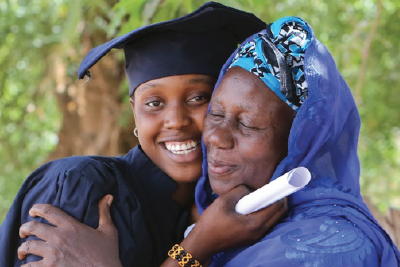Promoting gender equality is key to building prosperous households, communities, businesses and cooperatives.
Our Approach
Evidence suggests that gender inequities—the differences in access and opportunities among women, men, girls, boys and gender diverse individuals—significantly impact development outcomes. NCBA CLUSA recognizes the critical importance of addressing gender dynamics in its work to empower individuals and families to achieve resilience and economic security and exercise a better, longer and healthier quality of life.
NCBA CLUSA’s development approach emphasizes that its “clients are the decision makers when it comes to solving their communities’ most pressing development needs. This community-led approach highlights the importance of collective action, shared values and a focus on process. NCBA CLUSA applies this approach to its work in gender integration in building resilience, promoting economic growth, and supporting cooperative development. As members of households, communities and programs, women’s and gender diverse individuals’ agency and decision-making ability are a priority in all aspects of NCBA CLUSA’s work.
Beyond supporting gender integration to challenge inequitable gender and social norms and practices among women, men and gender diverse individuals in its programming, NCBA CLUSA also recognizes the importance of addressing gender as part of its wider efforts in diversity, equity and inclusion.
Building Resilient Communities
Our resilience work addresses systems and institutions and seeks to build the capacity of households and communities to respond and adapt to shocks such as natural disasters, income loss, illness and other expected stresses. It ensures that women and gender diverse individuals are not only part of the conversation, but that they are empowered to make decisions to participate meaningfully in preparation, response and adaptation to unexpected challenges within their households or communities. Projects in this portfolio focus on gender integration in the areas of governance, food security and nutrition, rural livelihoods, climate change adaptation, and natural resources management. Gender transformative approaches under this practice area may include strengthening women’s property rights, male engagement, addressing household decision-making through social behavior change communication, and strengthening women’s social capital through their groups and networks.
Creating Economic Opportunities
This practice area addresses gaps and barriers for women, men and gender diverse individuals throughout the entire market system, including gendered division of labor, income generation, access to financial services, access to technology or inputs, and market linkages. To support economic security and help create sustainable business models, it promotes women’s entrepreneurship and women-led economic initiatives by building capacity, strengthening business development services, and linking communities to resources. Relevant research in this practice area may include gendered value chain analysis or gendered market analysis to better understand existing gender roles and inequities and risks of gender-based violence for programs to address. Gender transformative approaches may include promoting women’s economic security by addressing gender and social norms through social behavior change communication alongside building the capacity of women farmers to start savings groups or access financial services, improving agricultural production, and reducing time poverty through better use of technology or improved farm management, value-addition processing, strengthening business relationships, leveraging private sector resources, and advocating for more equitable policies.
Strengthening Cooperatives and Producer Groups
As the country’s oldest and largest cooperative development organization and trade association representing cooperatives across all sectors, NCBA CLUSA is a leader in supporting cooperatives and producer organizations around the world. This work includes advancing women’s and gender diverse individuals’ participation in membership and governance bodies within cooperatives and producer organizations. Women’s participation and leadership in cooperatives allows them to enter the formal economy, gain economic independence, increase their self-confidence, and develop their capacities. NCBA CLUSA developed a Women’s Inclusion, Empowerment and Leadership in Cooperatives (WIELCOOP) blended learning training of trainers (TOT) guide. This TOT guide is used to train its own staff, facilitators and cooperative leaders so that they can in turn train other leaders, members and stakeholders on cooperatives and gender equity and empowerment. Overall, NCBA CLUSA’s work in this area focuses on reducing barriers to women’s participation in cooperative membership and leadership, as well as the capacity development of cooperative members, their families and other key stakeholders. It includes work in numerous areas: legal and regulatory framework reform; updating cooperatives’ bylaws; improving cooperatives’ governance and management practices; financial literacy and inclusion; and supporting development of new business lines and services that equitably serve members’ families.


